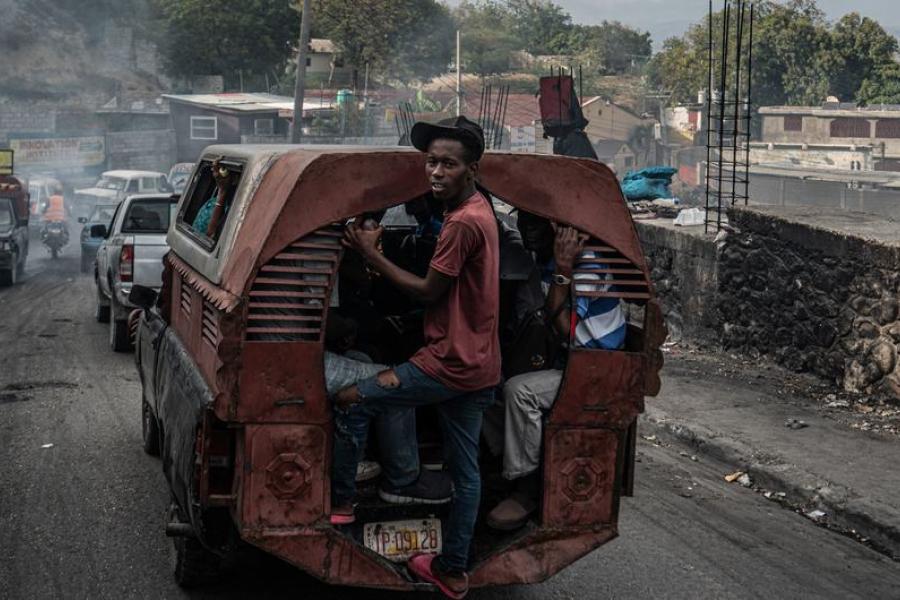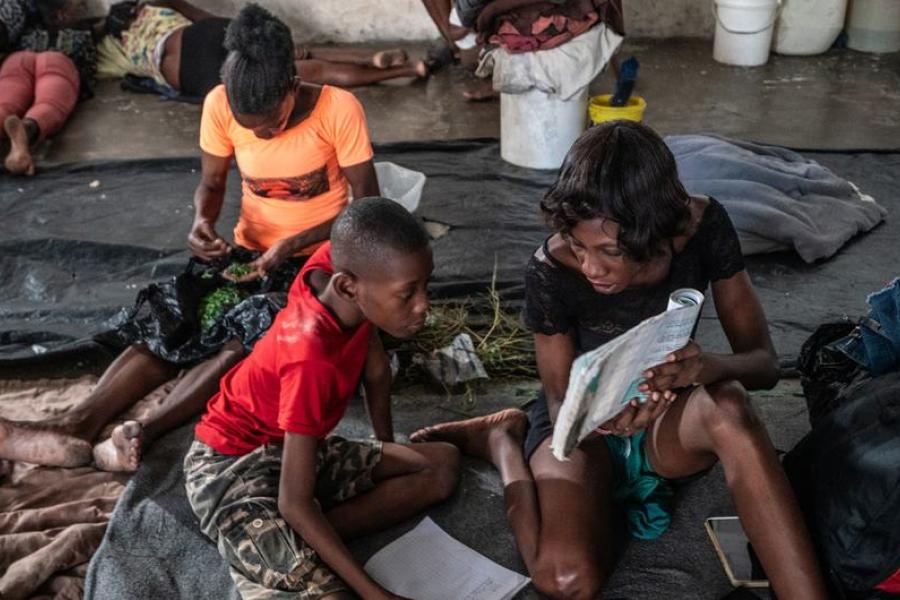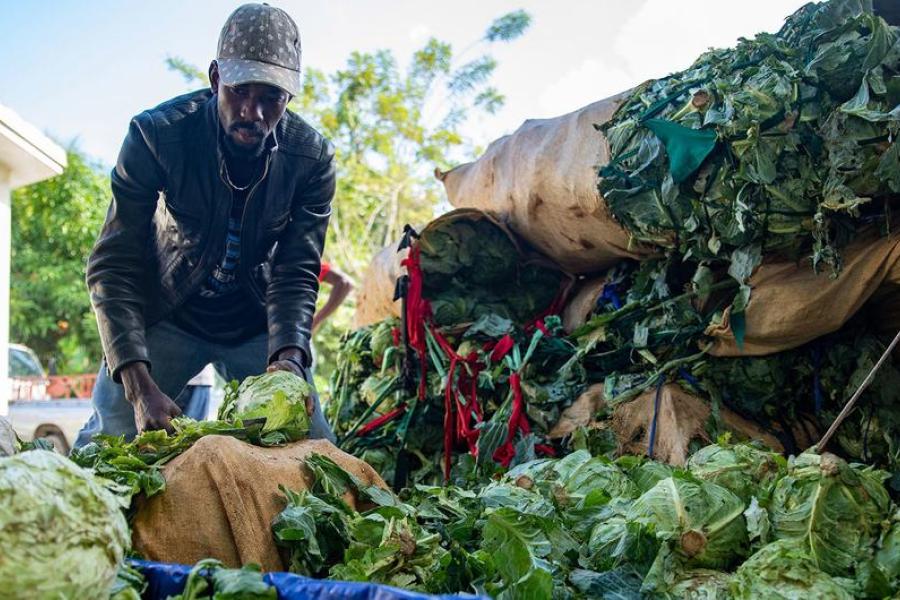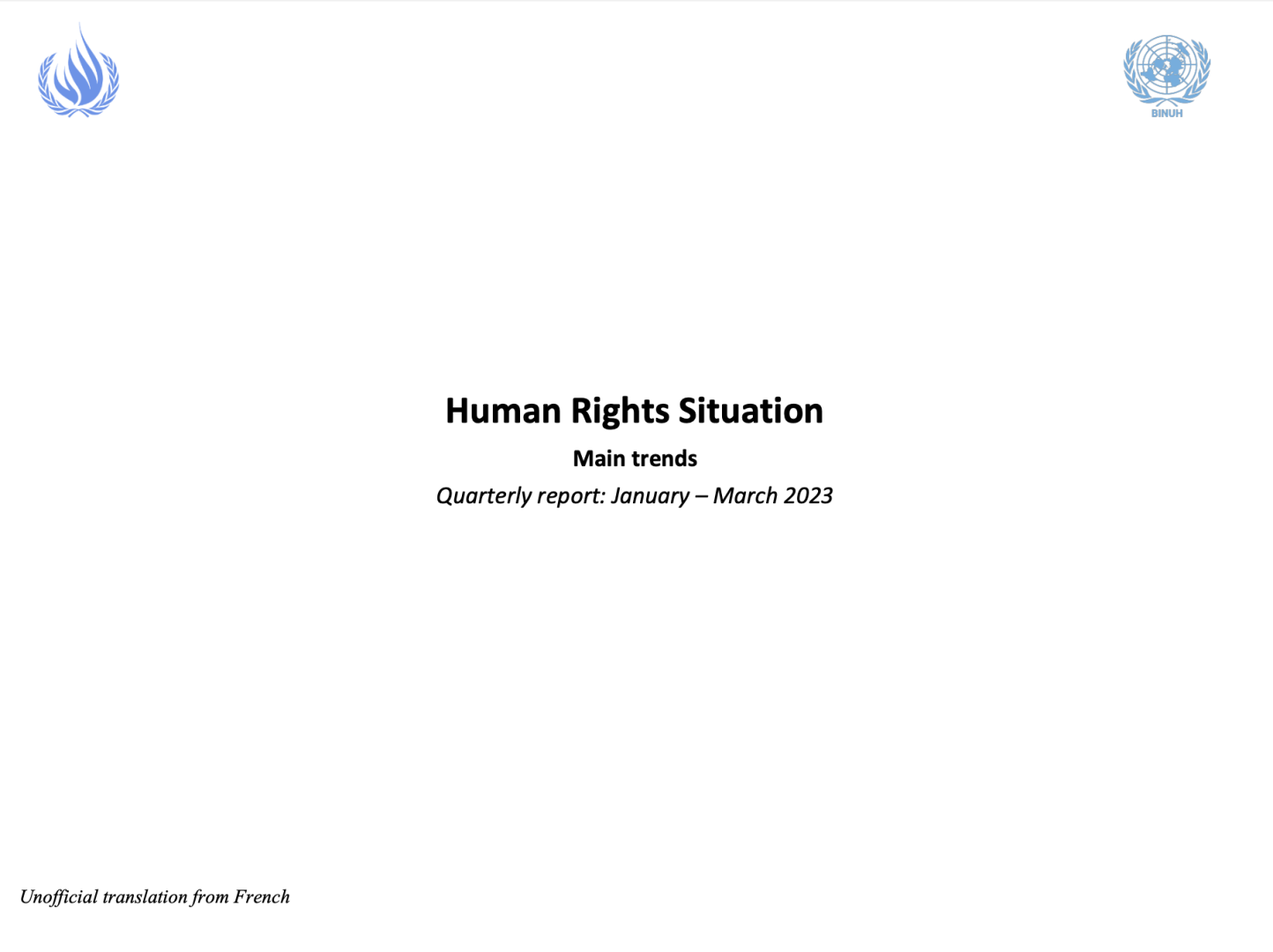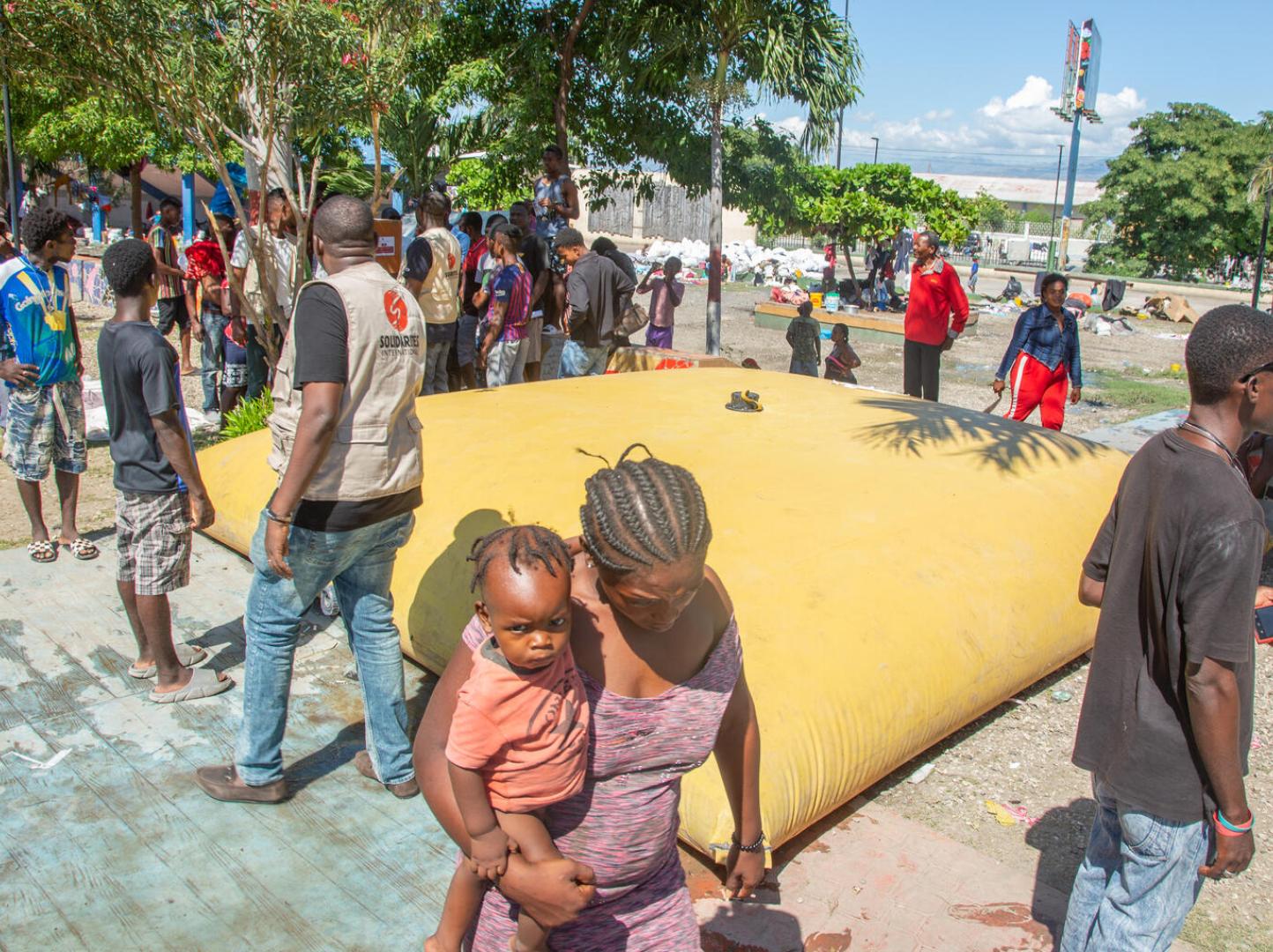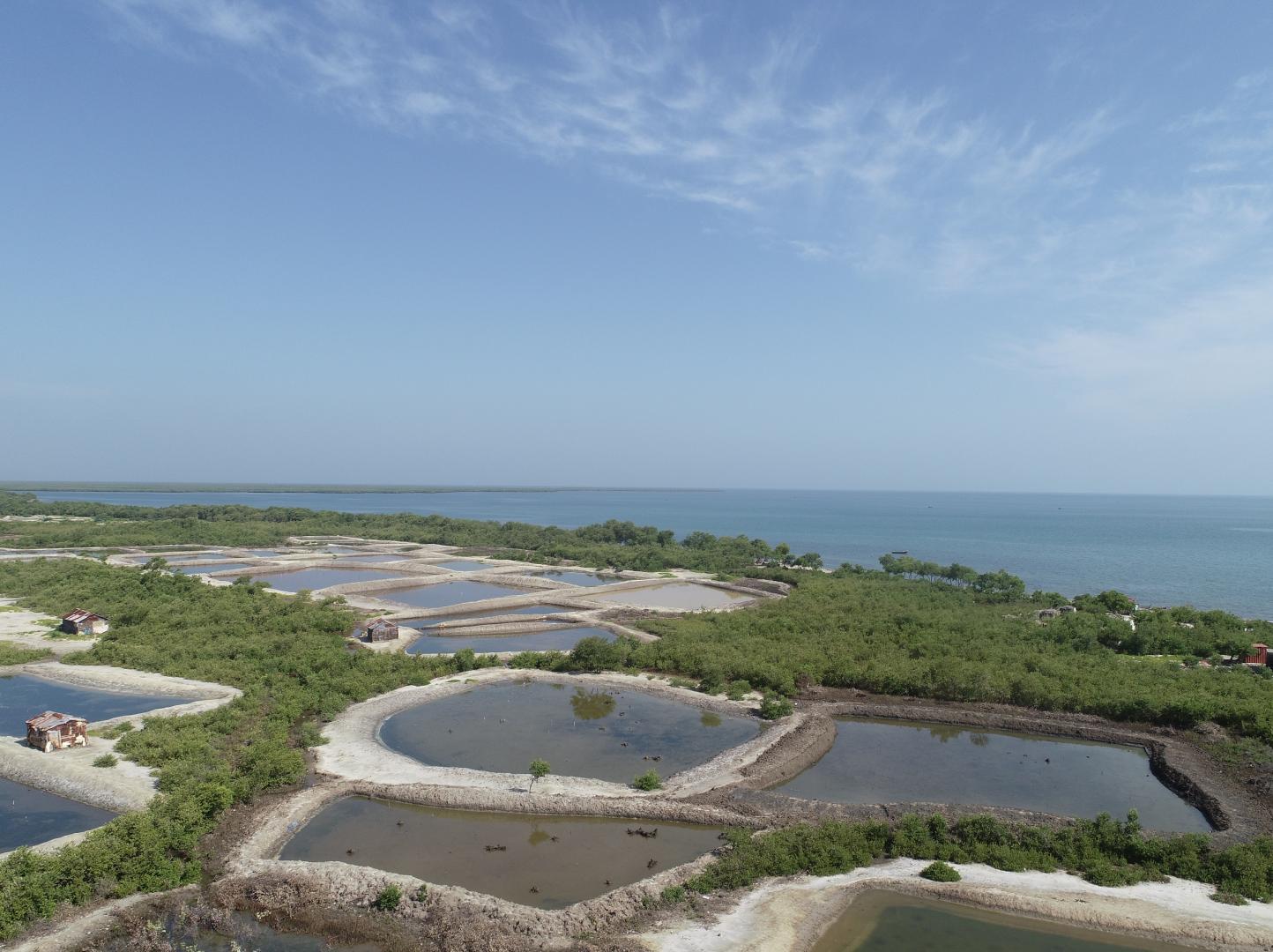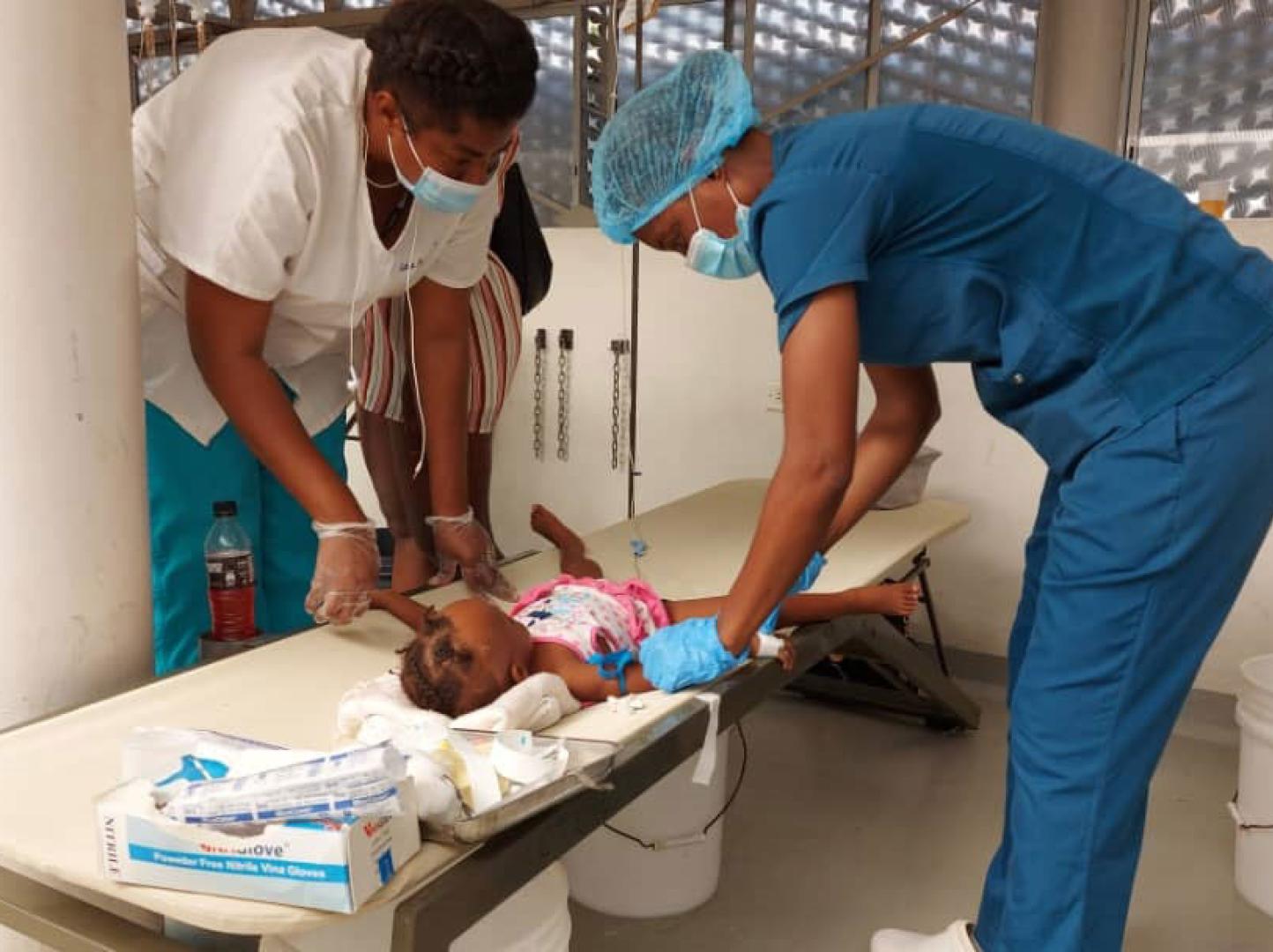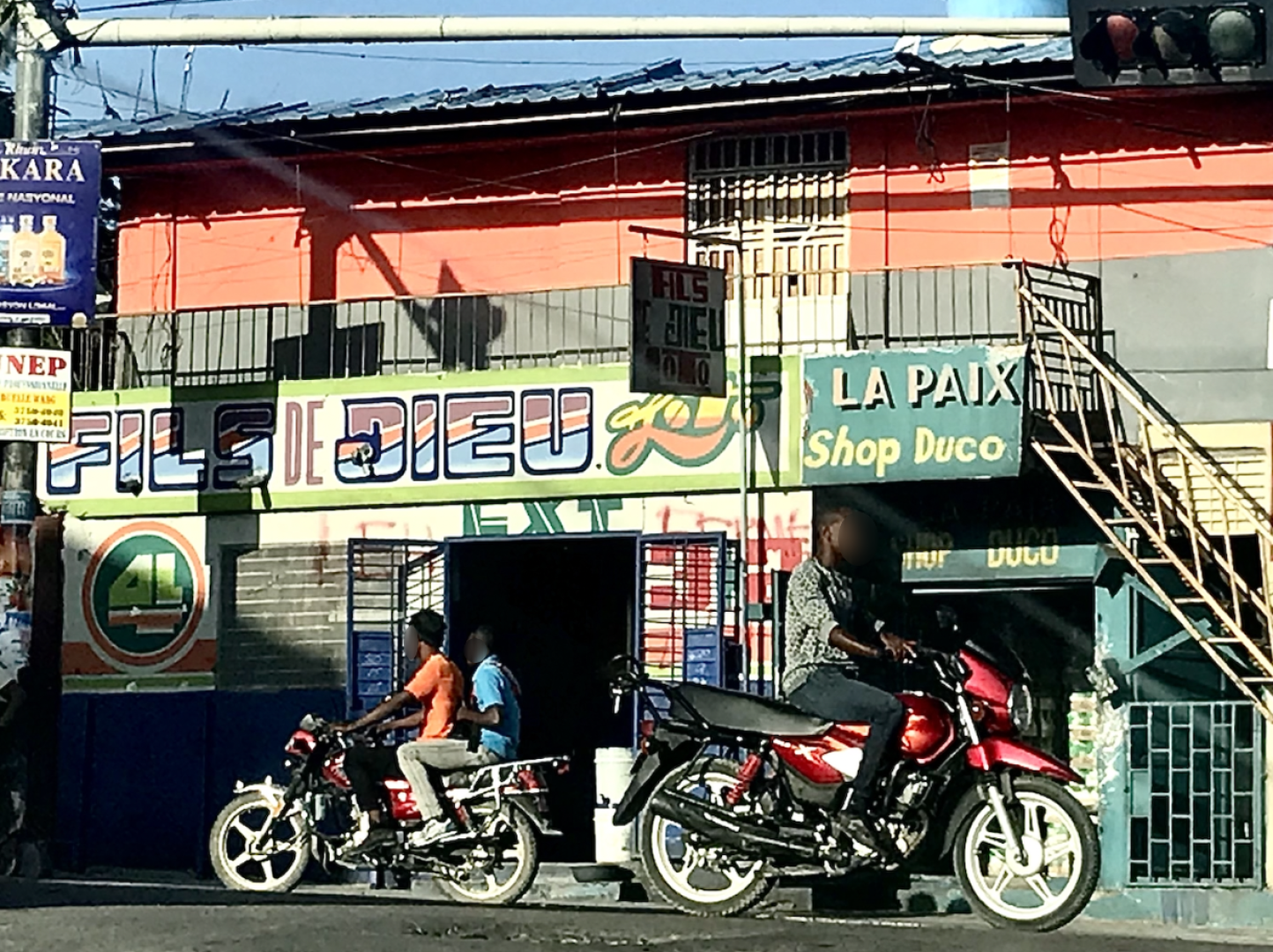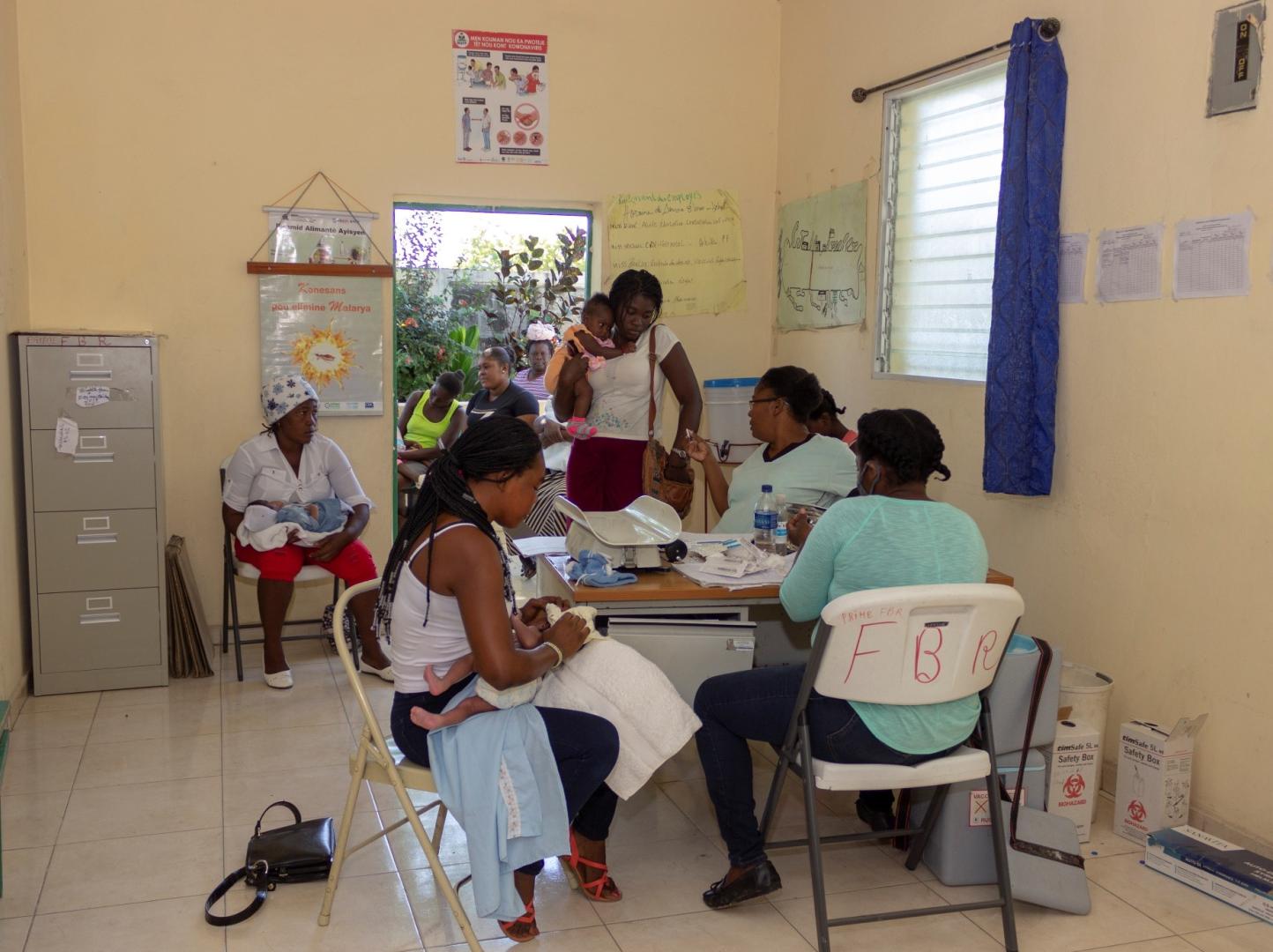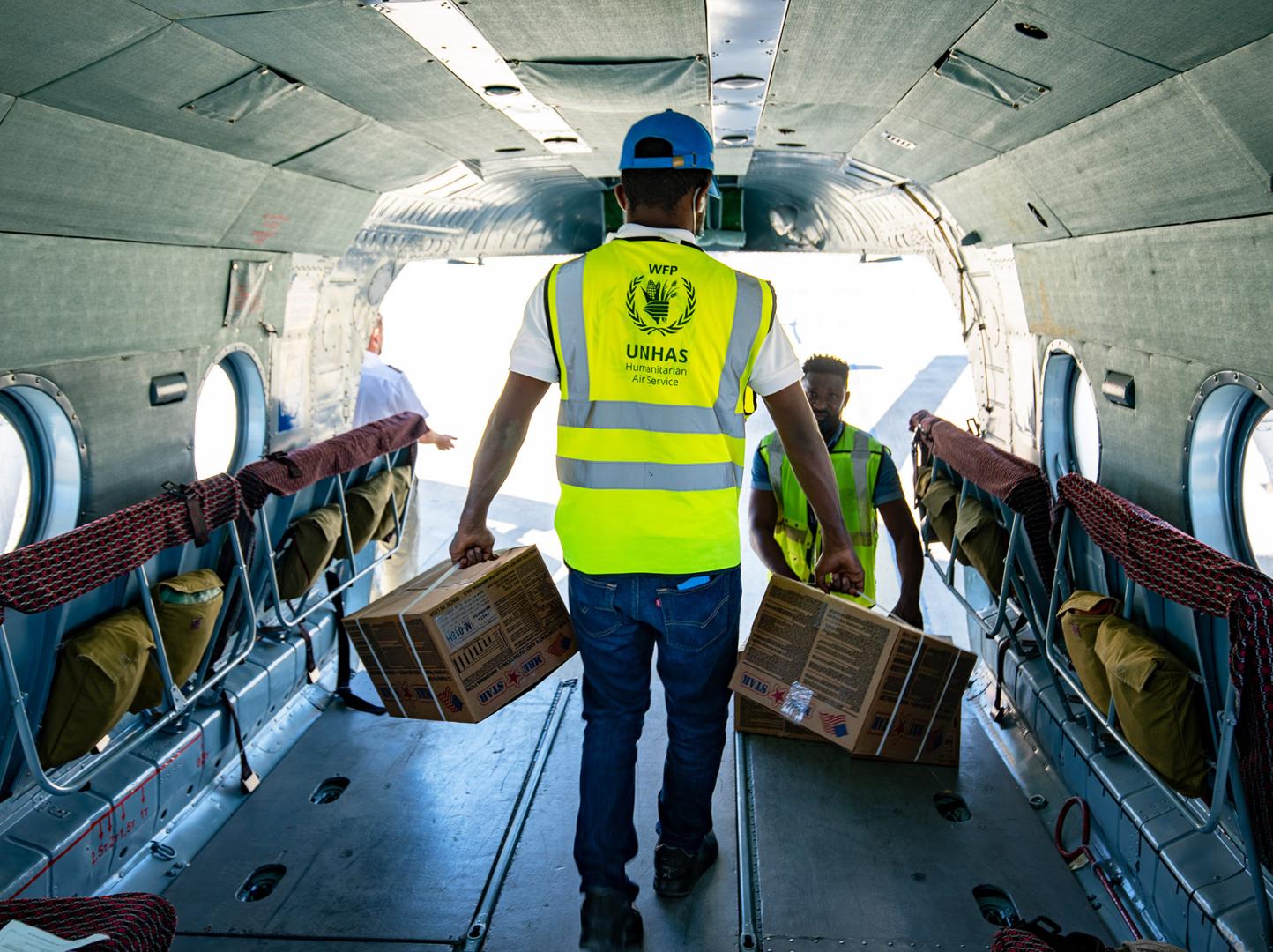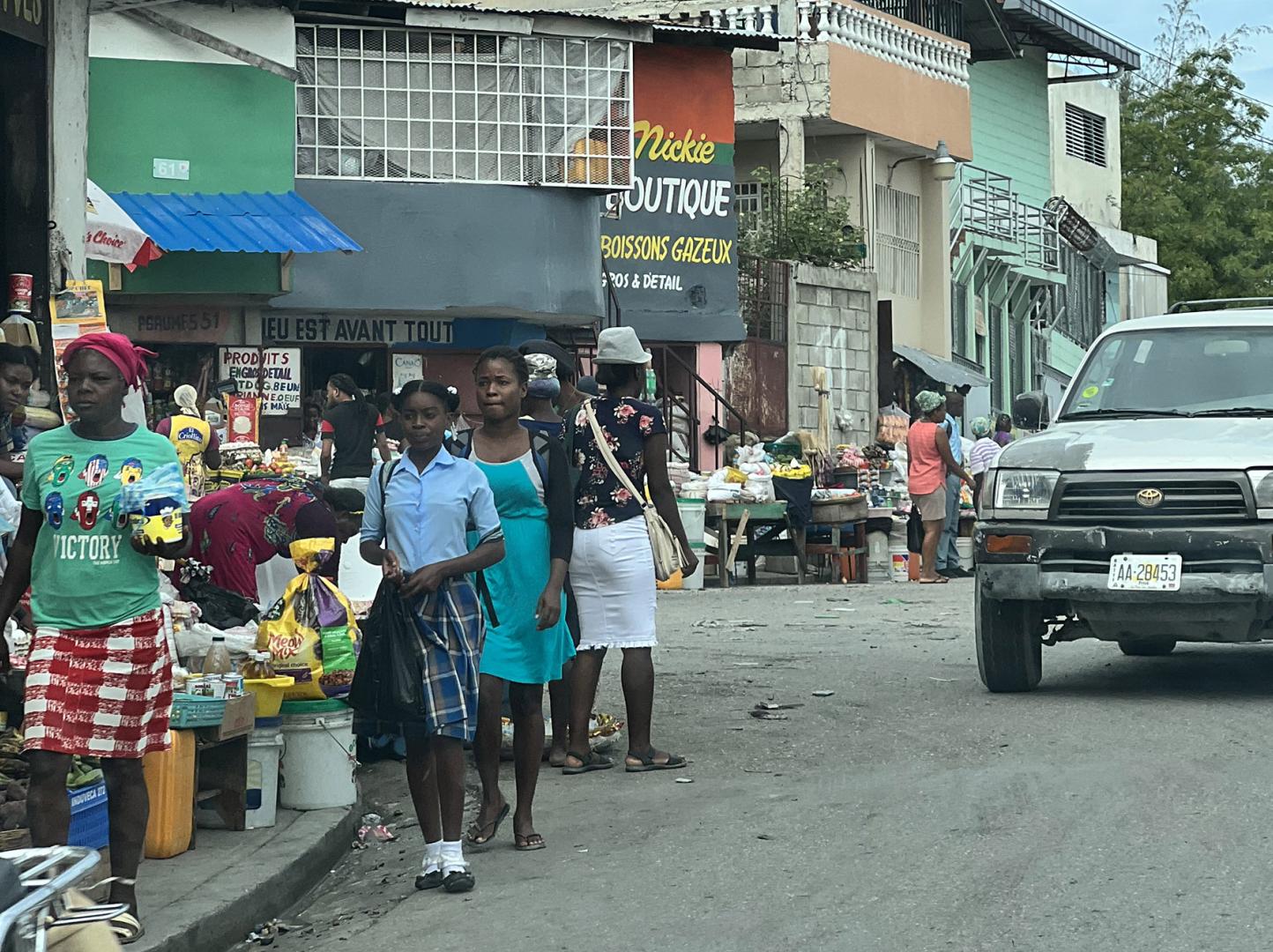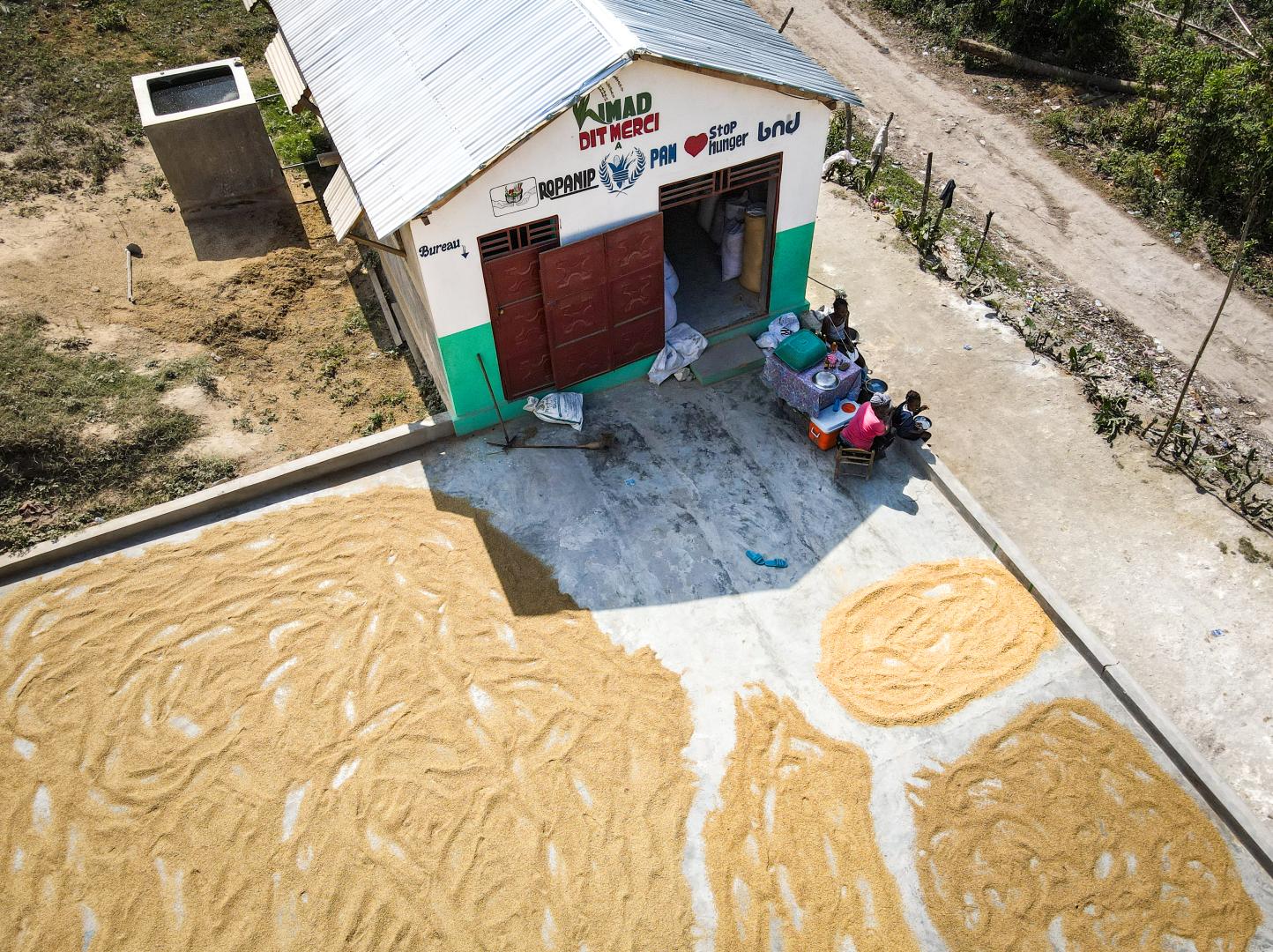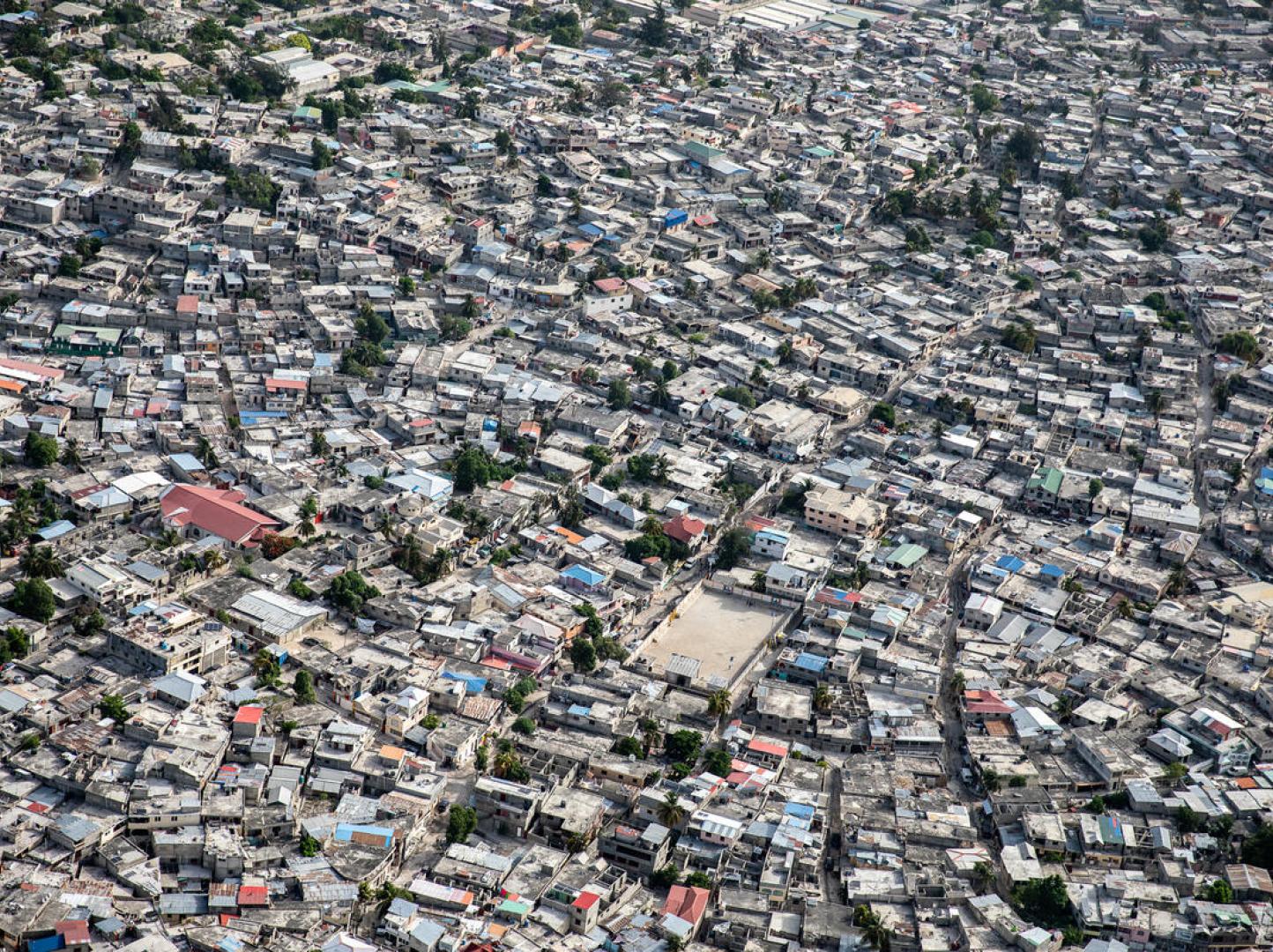Latest
Story
22 April 2024
First Person: ‘Our tears are dry, we are exhausted’ – Youth voices in Haiti
Learn more
Story
22 April 2024
UN envoy urges international solidarity with Haiti as gang violence spirals
Learn more
Press Release
13 April 2024
Statement attributable to the Spokesperson for the Secretary-General - on the establishment of the Transitional Presidential Council in Haiti
Learn more
Latest
The Sustainable Development Goals in Haiti
The Sustainable Development Goals (SDGs), also known as the Global Goals, are a universal call to action aimed at eradicating poverty, protecting the planet and ensuring peace and prosperity for all people. These are also the objectives of the UN in Haiti.
Speech
26 November 2023
Déclaration de la Coordonnatrice résidente des Nations Unies en Haïti, à l'occasion de la commémoration de la Journée Internationale pour l'élimination des violences à l'égard des Femmes et des Filles
Madame la Ministre à la Condition Féminine et aux Droits des Femmes,
Monsieur le Ministre de L’Éducation Nationale et de la Formation,
Madame la Ministre de la Jeunesse, des Sports et de l'Action Civique,
Madame la Présidente du Haut Conseil de la Transition,
Madame la Représentante Spéciale du Secrétaire général de l'ONU en Haïti,
Mesdames, Messieurs, les cadres des Ministères sectoriels présents,
Chers partenaires de la société civile, des organisations de défense des droits des femmes,
Mesdames et messieurs les membres du corps diplomatique,
Mesdames, Messieurs, Représentantes et Représentants d'agences de coopération,
Chers Collègues chefs d'agences des Nations Unies,
Mesdames, Messieurs de la presse écrite, audio-visuelle et en ligne,
Mesdames et Messieurs, en vos rangs, grades, titres et qualités.
Je suis très honorée d'être en votre compagnie pour commémorer la journée internationale pour l'élimination de la violence faite à l'égard des femmes, qui aussi marque le début de 16 jours d’activisme.
Cette journée est un appel à l'action. Pour toute la société haïtienne. Pour nous toutes et tous. Alors que je vous parle, le monde fait face à une régression des droits des femmes, marquée par des atteintes graves à leur dignité, la violence physique, la violence sexuelle et les féminicides.
En Haïti, presque une femme sur trois entre 15 à 49 ans est victime de violences physiques. Dans les quartiers les plus défavorisés, et parmi les communautés déplacées dans la capitale, Port-au-Prince, et dans les régions marquées par l'insécurité, particulièrement l’Artibonite, la prévalence de la violence faite aux femmes et aux filles est encore plus répandue. Une violence sexuelle, souvent très brutale.
Depuis mon arrivée dans le pays, je n'ai eu de cesse d'aller à la rencontre de survivantes. Dans des centres spécialisés, des écoles, etc. Et j’ai rencontré une jeune fille de 14 ans, qui déjà était mère à la suite d’un viol par des membres d’un gang armé.
J'ai pu constater de près leur douleur. J'ai pu écouter leurs histoires, leurs douloureux périples vers la reconstruction.
J'ai pu aussi ressentir leur espoir et aspiration à une vie meilleure. Et j'ai été impressionnée par leur résilience, leur courage et leur résistance, sans égale.
Et cela ne doit pas être négligé. Elle nous appelle à agir, maintenant, et de façon décisive.
Aujourd'hui, je veux témoigner de ma solidarité auprès de toutes ces femmes, mères, soeurs, filles, épouses, citoyennes et professionnelles de tout genre, qui ont été touchées, mais sont toujours debout.
La violence à l'égard des femmes et des filles en Haïti n'est pas récente.
Elle est ancrée dans des décennies d'injustice structurelle et de systèmes patriarchaux qui n'ont pas été bousculés. Dans toutes les sphères de la société.
En effet, on est tous engagés dans des cages qui obligent la société à agir en tant que femme ou en tant que fille ou garçon.
Mais ne nous y méprenons pas. Quand une femme ou une fille haïtienne est victime de violence, toute la société haïtienne est impactée. Nous en payons toutes et tous le prix. La violence a un coût dévastateur pour les femmes et les filles victimes. Elle limite leur participation dans toutes les sphères de la vie et les prive de leurs droits et libertés fondamentales. Mais la violence a également un coût tangible et intangible pour leur famille, leur communauté, leur entreprise, l'État entier.
Non seulement la violence à l'égard des femmes est légalement et moralement répréhensible, mais elle est un frein certain au développement durable et à tout progrès dans une société. Elle entrave la reprise économique équitable et la croissance durable dont le pays a pourtant tant besoin. Nos sociétés sont ainsi moins pacifiques, nos économies moins prospères, notre pays moins juste. Il est dès lors de notre devoir commun de mettre fin à ce fléau, à ce crime.
Je tiens à reconnaitre l'action du Gouvernement, particulièrement le Ministère à la Condition Féminine et aux droits des femmes, et des institutions publiques pour leur leadership visant à éliminer la violence faite aux femmes et aux filles en Haïti.
Je souhaite également saluer l'engagement des organisations de base, de femmes et de défense des droits des femmes dont les actions ont permis des avancées certaines dans cette lutte en Haïti. Les acteurs de la société civile et particulièrement les organisations féministes et féminines constituent nos meilleures armes pour une action plus intégrée entre les acteurs de développement, de la consolidation de la paix et les acteurs humanitaires.
Je souhaite également apprécier l'engagement de l'Union Européenne et de tous les partenaires techniques et financiers pour leur action aux côtés des agences des Nations Unies et du peuple haïtien dans ce combat, notamment au travers de l'initiative Spotlight.
Dans cette optique, une réunion s'est tenue mercredi dernier avec le gouvernement, la société civile et nos partenaires de développement pour réfléchir au renforcement de la réponse nationale à la problématique de la violence faite aux femmes et aux filles.
Mesdames et messieurs,
Aujourd'hui, je renouvelle l'engagement total des Nations Unies à continuer à soutenir chaque femme et fille en Haïti, ainsi que le Gouvernement, et à s'attaquer aux causes profondes de la violence sexuelle.
Un monde différent est possible. En Haïti, une société différente est possible.
Le thème choisi pour la campagne « Tous UniS » cette année - « Investir pour prévenir la violence à l'égard des femmes et des filles » - appelle chacun et chacune d'entre nous à agir.
Cela signifie :
Appuyer des lois et des politiques qui renforcent la protection des droits des femmes dans tous les domaines ;
Renforcer les investissements dans la prévention et le soutien aux organisations de défense des droits des femmes ;
Investir dans l’éducation civique ;
Écouter les survivantes et mettre fin à l'impunité des auteurs de violences, où qu'ils se trouvent ;
Garantir les droits sexuels et reproductifs de chaque femme ;
Soutenir les militantes et mettre en avant le rôle clé des femmes à tous les stades de la prise de décision ; et
Plus que jamais, garantir la voix et la participation active des femmes dans l'espace politique dans l'optique de la tenue d'élections dans un futur proche. Chères femmes, engagez-vous !
Chères femmes, engagez-vous !
Alors que la Déclaration Universelle des Droits de l'Homme célèbre ses 75 ans cette année, levons-nous et exprimons-nous. Osons construire un monde qui refuse de tolérer la violence à l'égard des femmes, où que ce soit et sous quelque forme que ce soit. Une fois pour toutes.
Merci
1 of 5
Story
20 October 2023
50 jeunes ambassadeurs de la paix par le sport
« Tout ce que j’ai appris ici ne restera pas enfermé dans un tiroir. Je vais le partager dans les coins de rues pour aider tout le monde et former beaucoup d’enfants afin qu’Haïti puisse sortir de ce qu’elle est. Quand naitra la nouvelle Haïti, nous serons déjà prêts ! », a indiqué Géraldine Calixte, coach et professeure d’éducation physique et sportive, désormais ambassadrice de la paix par le sport.
Cinquante jeunes, issus de quartiers en proie à la violence, ont reçu leurs certificats d’ambassadeurs de la paix par le sport, au cours d’une cérémonie organisée par l'Observatoire national du sport haïtien (ONASH) en collaboration avec le ministère de l'Éducation Nationale et de la Formation Professionnelle, ainsi que le système des Nations Unies en Haïti. Cet événement a eu lieu le mercredi 18 octobre 2023 à l'Hôtel Karibe.
Résultat du partenariat entre l'ONASH, l'École normale Pestalozzi, l'UNESCO, la Direction Santé Scolaire, l'Office de la Protection du Citoyen (OPC), et les fédérations haïtiennes de handball, de football, de volleyball et de basketball, la formation de ces jeunes récipiendaires sur l'Éducation Physique et Sportive et la Réduction des Violences dans les Communautés s'est déroulée du 17 juillet au 21 septembre.
Cette formation a permis aux participants, parmi lesquels figuraient 13 filles et 4 personnes à mobilité réduite, d’être des « acteurs engagés, des agents de transformation sociale, des médiateurs de la paix à travers le sport », comme l'a souligné Tatiana Villegas, Cheffe du Bureau de l'UNESCO en Haïti, lors de la cérémonie.
« Je félicite nos 50 jeunes futurs ambassadeurs de la paix, pour le choix qu’ils ont fait de s’engager pour promouvoir la paix à travers le sport » a déclaré, au nom de la Représentante spéciale du Secrétaire général et Cheffe du BINUH, Maria Isabel Salvador, le Commissaire de police des Nations Unies en Haïti, Papa Samba.
Ces jeunes sont désormais dotés de compétences essentielles en matière de coaching en football, basketball, et handball, de l'éthique et de la déontologie du sport, ainsi que de la planification des interventions en éducation physique et sportive. De plus, elle leur a enseigné des notions de gestion de conflits, de droits humains et de citoyenneté, les engageant ainsi à devenir de jeunes acteurs de paix et de stabilité à travers le sport.
L'initiateur de cette formation, le président de l'ONASH, Me. Edwing Charles, a félicité et encouragé les récipiendaires. Il a rappelé l'importance du sport en tant que vecteur de paix, de tolérance et de réconciliation, exprimant sa fierté d'honorer « ces jeunes dévoués à cette noble cause : celle de travailler à la réduction de la violence par le sport. »
Mesurant l’honneur, mais également la responsabilité que lui confère le nouveau rôle d’ambassadeur pour la paix par le sport, Rony Saint-Surin, handi-boxeur, a assuré qu’il compte « transmettre cette formation à mon club, à la fédération haïtienne de boxe, aux écoles, églises, partout où il y a du monde […] Je le partagerai aussi avec les sourds-muets, car je parle leur langue ».
1 of 5
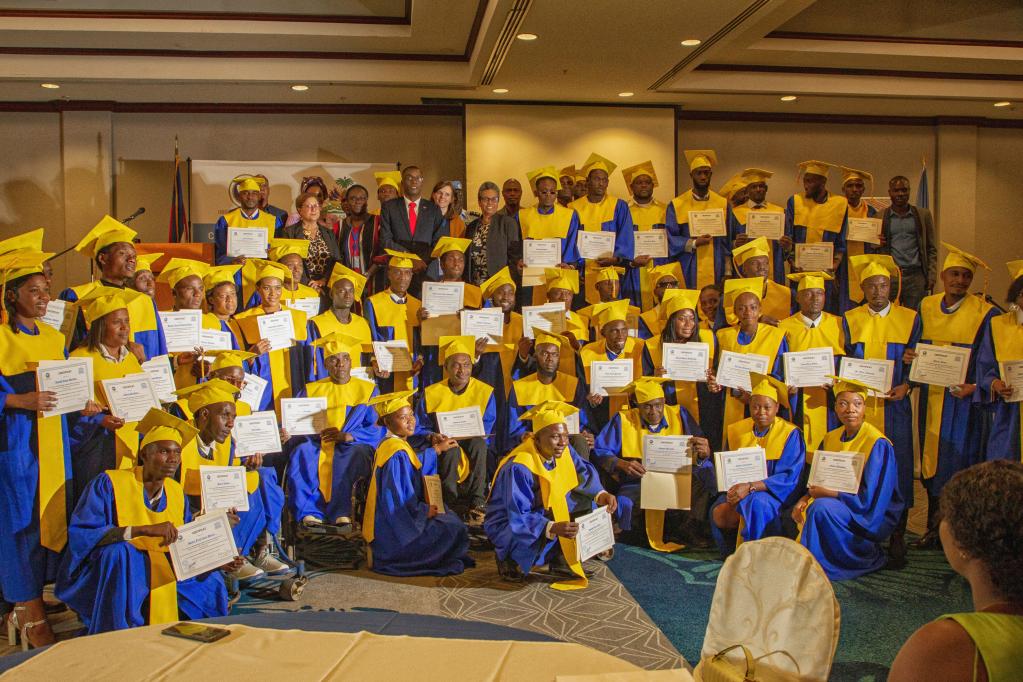
Speech
31 October 2023
Déclaration à la presse de l'Expert indépendant sur la situation des droits humains en Haïti
Port-au-Prince (31 octobre 2023) Mesye dam bonjou (Bonjour à tous). Permettez-moi de commencer par remercier les autorités pour leur soutien à mon mandat, le BINUH pour l’accueil et le soutien apporté, ainsi que les organisations de la société civile et aux victimes que j’ai pu rencontrer.
Je viens de conclure ma deuxième visite officielle en Haïti. Je continue d’être alarmé par la situation préoccupante qui s'étend rapidement dans d'autres départements, notamment l’Artibonite et le Nord-Ouest. Les meurtres, blessures et kidnappings sont l’apanage quotidien de la population. La violence sexuelle envers les femmes et les filles demeure endémique et aucune avancée concernant l’accès aux services et à la justice pour les survivantes n’a été enregistrée depuis ma dernière visite.
Je suis particulièrement préoccupé par l’impact de l’insécurité et de la violence sur les enfants. Les témoignages reçus sont édifiants. C’est une génération entière qui semble sacrifiée par la violence et l’avenir d’un pays qui est menacé par la situation dramatique de sa jeunesse. J’exhorte les autorités à accorder une attention prioritaire à la situation des enfants.
Beaucoup ont subi - et continuent de subir -de graves violences et violations de leurs droits. Ils sont aussi victimes de la situation humanitaire catastrophique avec un accès à la santé, à l’eau, à l’alimentation et à l’éducation sévèrement entravés. C’est particulièrement le cas dans les quartiers défavorisés sous contrôle des gangs et désertés par l’Etat. J’ai reçu de nombreux témoignages indiquant que beaucoup d’enfants souffrent d’émaciation, forme de malnutrition la plus mortelle.Plus de 500 000 jeunes n’ont pas accès à l'éducation. De nombreux enfants de ces quartiers sont recrutés par les gangs, faute d’opportunités, ou par peur des représailles.
Le système de justice haïtien demeure dysfonctionnel et nonadapté pour protéger les enfants en danger ou pour juger les mineurs en conflit avec la loi. Le Tribunal pour enfants est paralysé. J’ai visité la prison pour mineurs de Port-au-Prince, le Cermicol et ai fait le constat alarmant de la surpopulation carcérale, avec un taux d’occupation dépassant les 350%, mais aussi de l’insalubrité et du manque d’accès à l’eau potable exposant les enfants aux maladies. 99% des mineurs détenus dans la prison n’ont pas été condamnés, la plupart sont en situation de détention préventive prolongée. Ils sont incarcérés depuis des années pour vol d’une poule, de chaussures ou de téléphone, sans avoir vu un juge. J’ai néanmoins été encouragé par la mise en place d’une Commission intergouvernementale pour permettre de désengorger les prisons.Il nous faut des résultats rapidement.
La situation des déplacés internes me préoccupe également. Il y a au moins 200,000 personnes déplacées en Haïti. Beaucoup se trouvent dans des conditions de vie inhumaines, sans accès aux services de base, survivant dans des camps de fortune. J’ai reçu des témoignages effroyables d’enfants et de personnes âgées qui dorment à même le sol, près de monticules de déchets et sans accès à l’eau potable. J’ai aussi entendu des témoignages de femmes et de filles qui sont victimes de viols à répétition, sans accès aux soins. L’Etat doit prendre ses responsabilités pour prévenir les violations et les abus des droits humains mais aussi pour protéger sa population, en particulier les populations les plus vulnérables.
J’ai entendu un désir fort pour l’arrivée de la Mission Multinationale de Soutien à la Sécurité (MSS) au sein de la population haïtienne. Le déploiement imminent de cette mission dans des conditions strictes de respect et de protection des droits humains, est nécessaire pour soulager les populations en proie à la souffrance. Il est néanmoins fondamental que cette mission anticipe et prenne la mesure des défis actuels pour réussir son objectif sur le long-terme. Beaucoup de ces mesures doivent passer par un retour de la confiance de la population dans ses institutions.
Celles-ci doivent être renforcées, notamment par l’intermédiaire de systèmes de contrôles publics fiables et transparents pour endiguer la corruption et l’impunité. La Police Nationale Haïtienne (PNH) doit notamment accélérer son processus de « vetting » de ses agents et le système judiciaire doit achever la certification de ses magistrats. Les codes de déontologie doivent être mis en œuvre. Je réitère mes encouragements au travail mené par l’Unité de Lutte contre la Corruption (ULCC) pour lutter contre le fléau de la corruption.
Le régime des sanctions internationales a lancé un signal fort pour démanteler les réseaux de corruption qui gangrènent le pays. Il devra aussi être accompagné par des poursuites judiciaires au niveau national pour mettre fin à l’impunité. Je réitère mon appel à la communauté internationale pour mettre fin au trafic illégal d’armes et de munitions qui circulent en Haïti et continue de faire de nombreuses victimes chaque jour.
Un défi majeur concerne le fait que beaucoup de membres de gangs sont des enfants. Il sera nécessaire de mettre en œuvre des programmes de réhabilitation et de réinsertion pour la grande majorité d’entre eux. Selon les acteurs interrogés il est essentiel que l’Etat joue un rôle clef dans la reconstruction du modèle social et économique pour permettre aux plus vulnérables de trouver des opportunités sur place et ainsi éviter les départs massifs de populations en quête de jours meilleurs.
J’ai enfin visité le canal en construction sur la rivière Massacre à Ouanaminthe, ainsi que la frontière avec la République dominicaine. Je continue d’entendre des témoignages faisant état d’un impact désastreux de la fermeture de la frontière sur l’accès à la santé, à l’eau et à l’alimentation. Je réitère mon appel au dialogue et au passage de l’aide afin de protéger les populations vulnérables de l’impact humanitaire dramatique de cette mesure. Je salue par ailleurs le travail de la police à Ouanaminthe et Fort Liberté qui, grâce à une police communautaire et de proximité, a réussi à maîtriser la situation de la violence dans le département. 32 agents de police ont été tués depuis le début de l’année.
Assurer la sécurité et la protection de la population est une priorité. Surmonter les lacunes institutionnelles et renforcer l’Etat de droit restent des prérequis fondamentaux pour un changement sur le long terme. Ne répétons pas les erreurs du passé.
Misyon mwen an fini men travay la ap kontinye. Mèsi anpil. (Ma mission se termine mais le travail continue. Je vous remercie de tout cœur).
1 of 5
Publication
20 April 2023
Cadre de Coopération des Nations Unies pour le Développement Durable 2023-2027
Le Cadre de Coopération des Nations Unies pour le Développement Durable représente l’engagement collectif de l’ONU en Haïti afin d’accompagner les efforts du pays dans la réalisation de l’Agenda 2030 pour le développement durable et assurer une mise en œuvre du Programme Commun des Nations Unies ainsi que le Nouvel Agenda pour la Paix.
Le Cadre de Coopération des Nations Unies pour le Développement Durable est aligné sur les priorités du Plan Stratégique de Développement d’Haïti (PSDH) et sur la vision du Gouvernement visant à faire d’Haïti un pays émergent. Élaboré sur la base des principes de la réforme du Système des Nations Unies, ce Cadre de Coopération marque un nouvel élan dans le partenariat entre l’ONU et le Gouvernement pour la période 2023-2027. Il repose sur une vision partagée des défis et des opportunités du pays. Il s’aligne aussi sur les recommandations issues de l’Examen périodique universel (EPU) d’Haïti de 2022 et fait écho aux valeurs de justice, de liberté et de dignité portées par la Déclaration universelle des droits de l’homme.
1 of 5
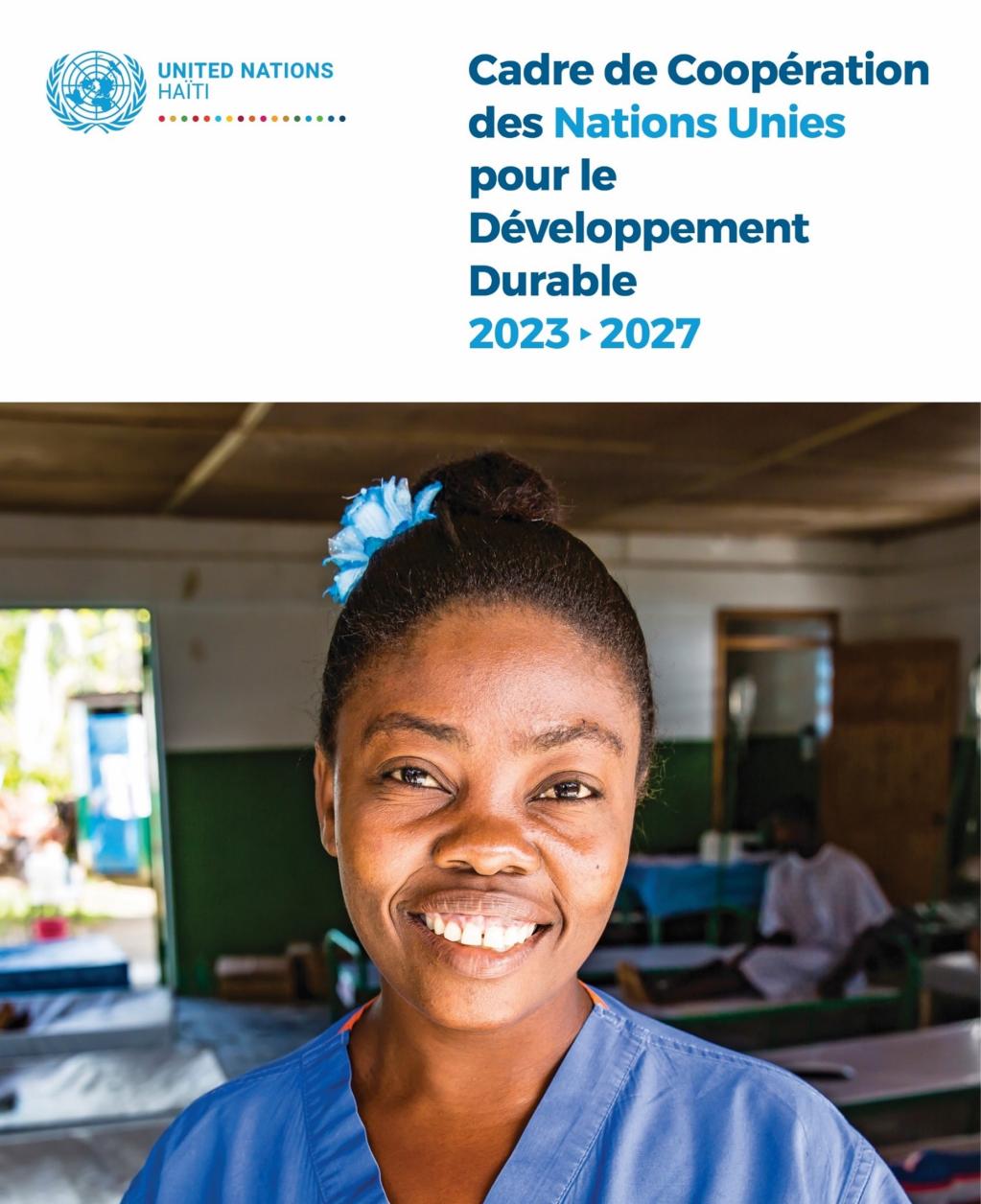
Story
16 August 2022
First Person: Taking to the sea to deliver aid in Haiti
A shipping officer working for the World Food Programme in Haiti has been explaining why the delivery of humanitarian aid by ship is becoming increasingly critical.
Captain Madeleine Habib, who is from Australia, spoke about her experiences ahead of World Humanitarian Day, which is marked annually on 19 August and the theme for which this year is “It takes a village.”
“I am a Shipping Officer for the World Food Programme in Haiti. I manage the organization’s coastal shipping service to ensure the safe transit of essential humanitarian goods and assets to the northern and southern parts of the country.
A maritime alternative is increasingly critical as gang control over the highways out of the capital continues to grow. This means that the Haitian population and humanitarian actors have limited freedom of movement in and out of the capital.
The situation has a huge impact on the population's income and on the implementation of humanitarian and development projects that should support the community.
This is especially true for the population of the southern peninsula of the country which is still suffering from the devastating impact of the August 2021 earthquake.
One year after the disaster, I recognize that thousands of people, especially in the south, are still struggling to recover and are unable to rebuild their lives because the growing insecurity in Port-au-Prince has shattered their economic prospects. Farmers in the rural south are unable to get their produce to markets so their livelihoods are suffering.
It takes a village and supply chain is an essential part of that village. We might not be on the frontline, but our network of trucks, ships and planes keeps essential humanitarian aid moving towards our beneficiaries.
Our team continues to ensure the transportation of humanitarian aid to these vulnerable populations.”
1 of 5
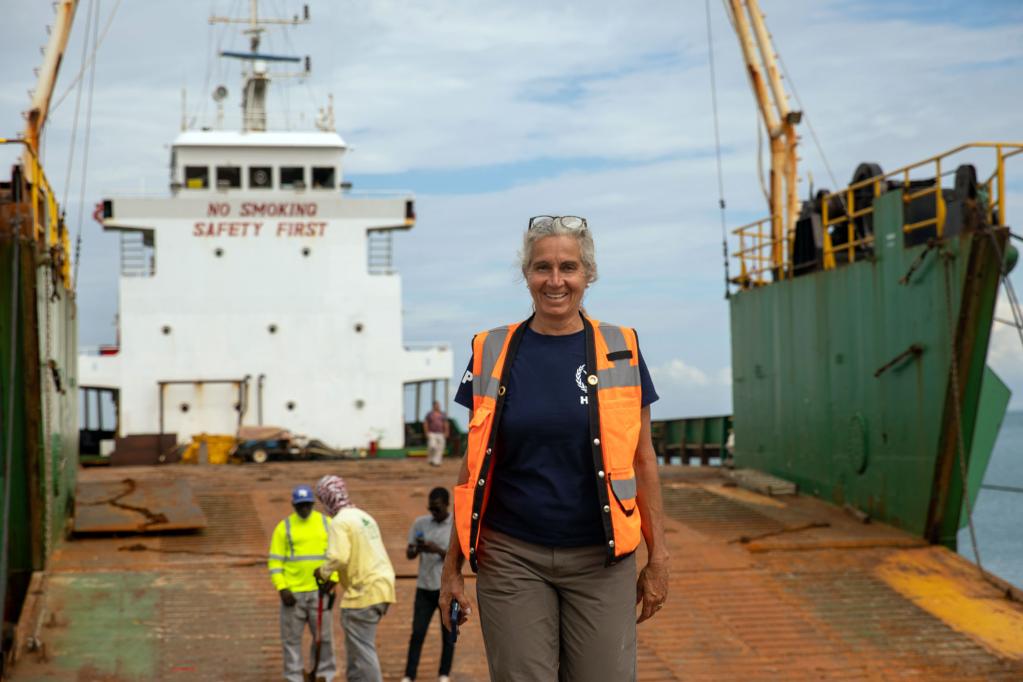
Story
23 April 2024
UN envoy urges international solidarity with Haiti as gang violence spirals
As gang violence increases in Haiti, the international community must continue to stand in solidarity with the population, the UN Special Representative for the country told the Security Council on Monday.“Today, it pains me to note that all speeches and callings had not avoided that some of the worst scenarios for Haiti have become realities in recent months and weeks,” said Maria Isabel Salvador, who also heads the UN mission in Haiti, BINUH.Speaking from the capital, Port-au-Prince, she said it was impossible to overstate the increase in gang activity in the city and beyond, along with the deterioration of the human rights situation and the deepening of the humanitarian crisis.Last October, the Security Council authorized the deployment of a Multinational Security Support mission (MSS) to assist Haiti’s embattled police force. Although more than five million people, roughly half the population, are going hungry and hundreds of thousands have been displaced, a $674 humanitarian appeal for Haiti is less than nine per cent funded.Attacks and confrontationsMs. Salvador recalled that in early March, gangs mounted coordinated attacks against key state infrastructure, including several police stations and two of the main prisons in Port-au-Prince, as well as educational and health facilities, and religious sites. They also launched several attacks against the Presidential Palace, sparking violent clashes with the Haitian National Police (HNP), leading to multiple casualties. Furthermore, gang confrontations around the international airport have forced all commercial airlines to halt services.She noted that roughly 2,500 persons were killed or injured due to gang violence during the first quarter of the year. This represents a 53 per cent increase over the previous reporting period, making it the most violent quarter since BINUH began recording statistics two years ago.Deploy Multinational Support MissionMs. Salvador said the national police - assisted by Haiti’s “modest” Armed Forces and advised by BINUH and other international partners - have deployed immense efforts to contain the violence while being targeted by the gangs. “Nevertheless, the severity of the current crisis underscores the gaps in capacity within the national structures and the urgent need for international assistance, namely through the immediate deployment of the MSS,” she said.On the political front, she noted that Haitian stakeholders have worked to put their differences aside in efforts to find a common path towards restoring democratic institutions, including establishing a Transitional Presidential Council following the resignation announcement by Prime Minister Ariel Henry in March. Security critical for progressA number of other bodies are also expected to be established, including a National Security Council and a Provisional Electoral Council “which is urgently required to set plans in motion for the organization of elections.”Ms. Salvador noted that despite the recent positive developments on the political front, improving the security situation remains a condition sine qua non for further progress. “I cannot stress enough the need to assist Haiti with its efforts to reestablish security,” she said. “One and a half years since Haiti requested assistance to enhance security and more than six months since this Council authorized the deployment of the MSS, we must continue to stress the importance of its urgent deployment.” Children in the crosshairsCatherine Russell, head of the UN Children’s Fund (UNICEF), appealed for greater support for the humanitarian plan for Haiti. Of the roughly 5.5 million Haitians who need assistance, three million are children.She said boys and girls are being injured or killed in the violence each day. Some are being recruited, or join armed groups out of sheer desperation. Recent UNICEF data indicates that anywhere from 30 to per 50 cent of armed groups have children in their ranks."Women and girls continue to be targeted with extreme levels of gender-based and sexual violence,” she added.“Last year, thousands of cases of sexual violence were reported, many of which were perpetrated against children. The true number of cases is likely much higher.”Humanitarian activities have also fallen victim to the violence as access to the port in the capital has been cut off because of armed group operations in the area.Ms. Russell said nearly 300 containers of humanitarian supplies are now stranded, including 17 UNICEF containers loaded with nutrition supplements, as well as neonatal, maternal and medical supplies. Stand with HaitiThe Executive Director of the UN Office on Drugs and Crime (UNODC) Ghada Waly, said the violence "is made possible by the continued influx of guns into Haiti and is supported by corruption."Recent events also suggest concerning signs of collusion between different gangs, she added.The latest wave of violence saw reported fighting between gangs, but also signs of collaboration between certain groups to carry out attacks.Furthermore, the attacks targeting key infrastructure were another reminder of the significant increase in firepower that the gangs possess, as weapons continue to flow into Haiti.“We must stand with Haiti’s institutions and citizens in confronting violence, corruption, and chaos, and in working for a more stable and secure future for the people of Haiti,” she said. This article first appeared in UN News.
1 of 5
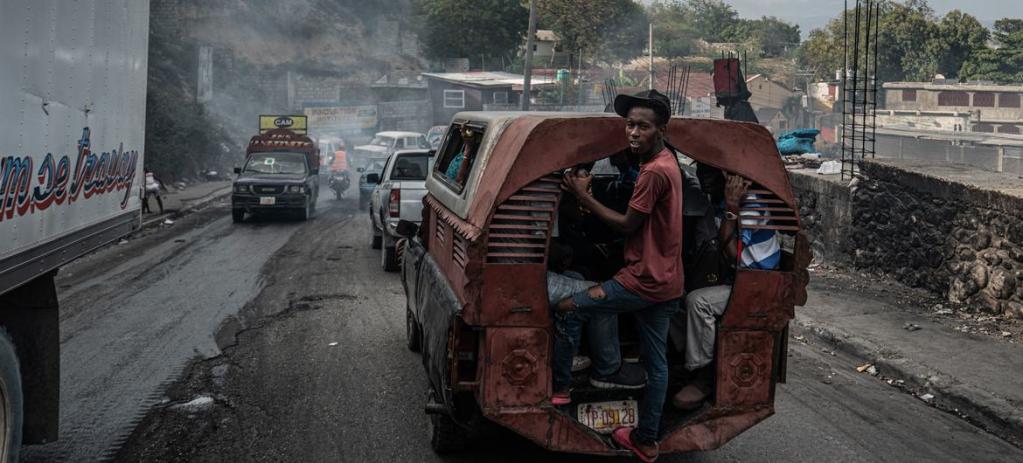
Story
23 April 2024
First Person: ‘Our tears are dry, we are exhausted’ – Youth voices in Haiti
A youth activist in Haiti has described how years of gang violence, kidnappings and insecurity in the country’s capital, Port-au-Prince, has forced their “tears to run dry”.Duval Dormeus is part of a group supported by the UN Peacebuilding Fund and was first interviewed by UN News back in July 2022.The security situation has worsened in the Caribbean country since then. In the first three months of 2024, over 2,500 people have been killed or injured due to gang violence, according to the United Nations mission in the country, BINUH.Mr. Dormeus told UN News how he has managed to get by over the past two years.“I am looking at the bad state of my country. I am looking at the lives of people whose lives are burdened with violence and misery. I'm watching how people have become resigned to poverty.There are more bandits, and I'm watching how they are turning Haitians into refugees in their own country. Banditry, prostitution and kidnapping are the big businesses here.I am looking at the insecurity that does not spare anyone – entrepreneurs, artists, students, traders, we are all affected.I'm looking at a dead-end country. I'm looking at how 14-year-old children are forced into prostitution by adults.In this country, the preferred food for dogs and pigs is the fresh bodies they find on the streets of the city.Misery, death, squalor and unemployment are all on the rise. We can hear the sound of gunfire, and there are deaths every day.Many young men no longer believe in hard work and patience. A place of warI still live in the Cité Soleil neighbourhood, a place of war, a place of misery, even though as a country Haiti is barely habitable. But, despite everything, we are resilient. This is how we survive.Everything that is happening in front of me makes me tired. I want to find refuge somewhere, but I cannot hide as I need to resist.My breath is exhausted, and our tears, the tears of young people, are dry.I’ve seen too much for someone of my age. My head is spinning, but my brain will not stop thinking, so I continue to fight.Motivating young peopleI have continued to work in a community organisation [Comité Consultatif de Jeunes] which supports young people. We are working hard in areas which are affected by gang violence to reduce juvenile delinquency.We do this through group activities, getting young people together from neighbourhoods which are controlled by different gangs to discuss the challenges they face and their hopes for the future.I am paid for these group activities, and this is how I survive.Despite the many problems, I feel as though I have grown in the last two years due to my work in the community. I am always available to motivate and support other young people.I would like to get to know youth from other countries to exchange ideas and to understand how they deal with the problems they face, including climate change, technology and sustainable development.When I first spoke to UN News, my identity was protected for security reasons. I was anonymous.Even though the situation is now more dangerous, I want to show my face and demonstrate the sort of person I am.I know there are risks but, in this way, I think my family, my friends and the community will be better protected.Comité Consultatif des Jeunes is part of a programme called Semans Lapè (seeds of peace) which is managed by the non-governmental organisation Concern Worldwide. It has been funded by the UN Peacebuilding Fund in line with the UN’s youth, peace and security agenda, which calls for the full participation of young people in issues of peace and security in their communities. This article first appeared in UN News.
1 of 5
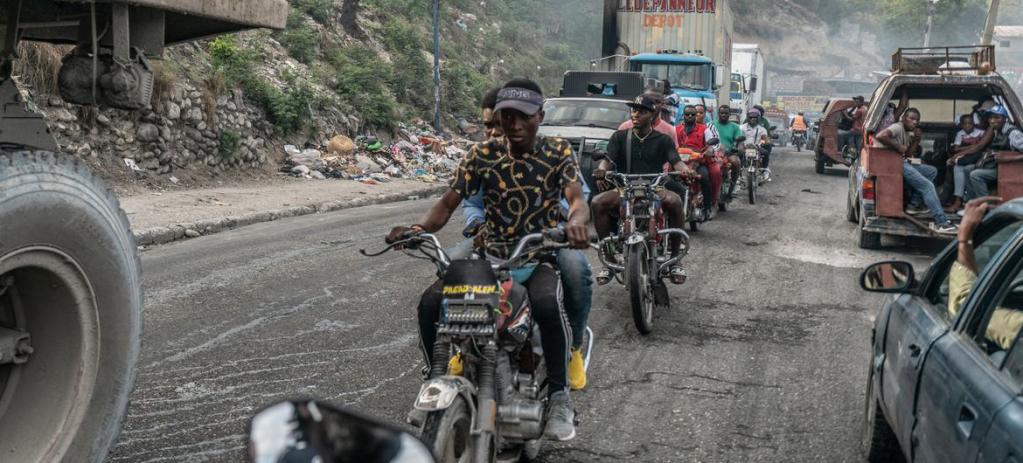
Story
09 April 2024
Getting children back to school in deadly gang-ravaged Haiti
Against the backdrop of a humanitarian crisis and gang violence in Haiti, UN agencies are warning that children are suffering not just from a lack of schooling but also through witnessing violence.Students in the capital Port-au-Prince have missed hundreds of hours of class time over the past year and now, now, more than one million Haitians are facing emergency levels of acute food insecurity, according to a new UN-backed report.As deadly threats to school security continue in Port-au-Prince, and northern parts of the Artibonite department, UN News examined the situation on the ground and how the UN is responding to the worsening educational crisis. Massive school closuresBy the end of January, a total of 900 schools had temporarily closed mainly in Port-au-Prince, depriving around 200,000 children of their right to education, according to UN Children’s Fund (UNICEF).Many other schools abruptly shut in Port-au-Prince in late February, when armed gangs coordinated breakouts in jails, freeing around 4,500 prisoners.Gangs reportedly now control 80 to 90 per cent of the capital, and in the ensuing chaos, UN agencies on the ground reported cases of armed groups recruiting children, spiralling violence, looting and destruction.“The Haitian population is caught in the crossfire,” said Catherine Russell, head of UNICEF. “Spaces for children have been transformed into battlegrounds. Each passing day brings new deprivations and horrors to the people of Haiti.”Basic security is urgently needed for the lifesaving services and for aid workers to reach those in desperate need, she said, calling for the protection of schools, hospitals and other critical infrastructure children rely on and for safeguarding humanitarian spaces. Classrooms become homeAs of late March, violence had displaced at least 362,000 people, with many trapped in the besieged capital and thousands finding temporary shelter in public buildings, including schools.Each classroom turned into a temporary home for multiple families. Playgrounds became tented shelters. Gymnasiums were transformed into open dormitories for those seeking safety.“Many schools are not accessible as violence is ramping up around them,” said UNICEF’s representative in Haiti, Bruno Maes. “Some are occupied by gangs, others by displaced people and still more have been looted or destroyed.”On the afternoon of 25 March, heavily armed groups entered a downtown Port-au-Prince school and set fire to 23 classrooms. Aid agencies condemned the incident. In another incident in the Port-au-Prince neighbourhood of La Saline, 3,500 children were trapped in two schools as gangs fought around them. UNICEF engaged with the armed groups for four days before they could secure the safe release of the children.UNICEF has urged all parties to safeguard students, educators, parents and educational infrastructure in line with the Safe Schools Declaration, a global political commitment endorsed by 119 countries, including Haiti, for better protection measures and support for continuing education during armed conflicts. Terrorised and traumatised “The situation is desperate for children,” said UNICEF’s Mr. Maes. “Children are killed, wounded, raped, displaced and denied access to basic services, including school,” adding that they are “terrorised and traumatised”, some after witnessing burnt bodies on the streets.Amid the very clear dangers, parents “still want to send their children to school”, he said. “Education is at the heart of every Haitian family; people put a very high value on it.” As gangs continue to expand their control of vital roads and ports, their grip is extending outside the capital and the threat to school safety is mounting.Despite this, the majority of schools outside the troubled gang-controlled areas of Port-au-Prince and Artibonite are still functioning. Many have admitted children who have fled because of violence and insecurity, although some parents are unable to pay school fees due to increasing poverty. Multipronged responseUN agencies have been working together to provide lifesaving essentials, like food, water and shelter, to thousands of Haitians in need and helping to get children back to school using new approaches.Efforts include an International Organization for Migration (IOM) initiative currently providing psychosocial support to students forced out of school by the violence, and the World Food Programme (WFP) supports hot meals for 250,000 children across the country.Part of UNICEF’s work is assisting families affected by violence and displacement to reintegrate children into formal education. Where this is not feasible, the agency works with partners to establish alternative, safe and temporary learning environments. Redefining schoolsThe goal is to get children back to learning and into school meal programmes, according to a UNICEF report, published in French in late March.If schools remain shuttered, distance learning can be deployed via radio, television and e-learning platforms. UNICEF is collaborating with the Ministry of Education to find a way to deliver this via Radio Télé Éducative (RTE) broadcasts on Haiti’s national radio station.Other opportunities for engaging students during the crisis include boosting capacities at schools currently accommodating displaced pupils.Learn more about what the UN is doing to help Haiti in our explainer here. This article first appeared in UN News.
1 of 5
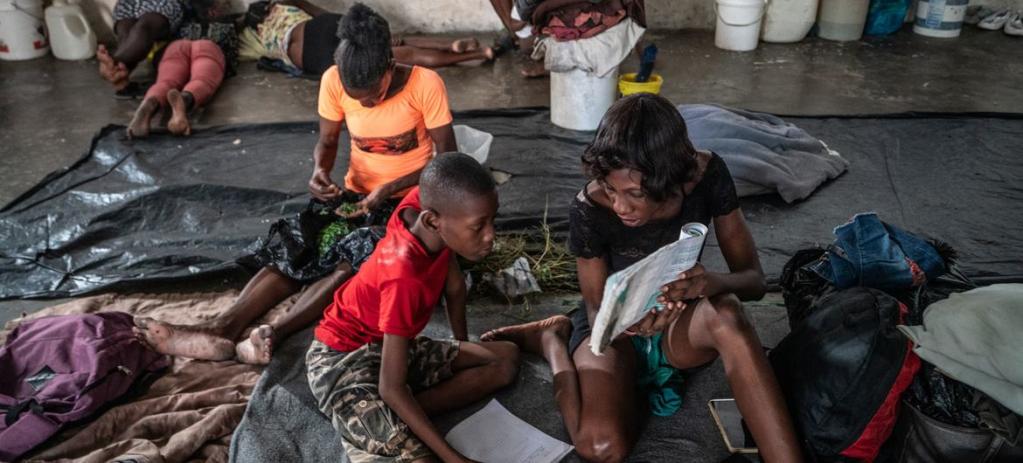
Story
01 April 2024
Explainer: Feeding Haiti in times of crisis
Almost five million Haitians are going hungry and need food assistance, according to recent UN figures, but the violence and related insecurity created by heavily armed rival gangs operating mainly in the capital are posing more questions about how to make sure those beleaguered people get enough to eat, now and in the future.Gangs reportedly control up to 90 per cent of Port-au-Prince, raising concerns that hunger is being used as a weapon to coerce local populations and hold sway over rival armed groups.They control key routes to farming areas to the north and south and have disrupted the supply of goods, including food. This in a country which has a predominantly rural farming population which some believe could be self-sufficient in food. So, what’s gone wrong? Here are five things you need to know about the current food security situation in Haiti: Are hunger levels rising?There are some 11 million people in Haiti and according to the most recent UN-backed analysis of food security in the country around 4.97 million, almost half the population, needs some type of food assistance. Some 1.64 million people are facing emergency levels of acute food insecurity.Children are particularly impacted, with an alarming 19 per cent increase in the number estimated to suffer from severe acute malnutrition in 2024.On a more positive note, the 19,000 people who were recorded in February 2023 as facing starvation conditions in one vulnerable neighbourhood of Port-au-Prince have been taken of the critical list. Why are people going hungry?UN Children’s Fund (UNICEF) Executive Director Catherine Russell said the current “malnutrition crisis is entirely human-made”. The key drivers of the current food insecurity are increased gang violence, rising prices and low agricultural production as well as political turmoil, civil unrest, crippling poverty and natural disasters.An estimated 362,000 people are now internally displaced in Haiti and have difficulties feeding themselves. Some 17,000 people have fled Port-au-Prince for safer parts of the country, leaving behind their livelihoods and further reducing their ability to buy food as prices continue to increase.According to the UN Security Council-mandated Panel of Experts on Haiti, gangs have “directly and indirectly threatened the nation’s food security”. The escalation of violence has resulted in economic crises, increased prices and exacerbated poverty. The gangs have disrupted food supplies by, at times, shutting down the economy by threatening people and mounting widespread roadblocks, known locally as peyi lok, as a deliberate and effective ploy to stifle all economic activity.They have also blocked key transportation routes and levied extortionate, unofficial taxes on vehicles that attempt to pass between the capital and productive agricultural areas. In one case, a gang leader in Artibonite, the country’s main rice growing area and a relatively new focus for gang activity, issued multiple threats on social media, warning that any farmers returning to their fields would be killed. The World Food Programme (WFP) reported in 2022 that there had been a notable decrease in cultivated land in Artibonite.Meanwhile, the UN’s Food and Agriculture Organization (FAO) says that in 2023, agricultural production plummeted by around 39 per cent for maize, 34 per cent for rice and 22 per cent for sorghum compared to the five-year average.How did we get to this point?While the current hunger crisis in Haiti has been exacerbated by the control the gangs exert over the economy and daily life in Haiti, it has its roots in decades of underdevelopment as well as political and economic crises.Deforestation partly due to poverty and natural disasters like flooding, drought and earthquakes, have also contributed to food insecurity. Trade liberalization policies introduced in the 1980s significantly reduced import taxes on agricultural products, including rice, maize and bananas, undercutting the competitiveness and viability of locally produced food.What is the UN doing?The UN humanitarian response continues in Haiti in coordination with the national authorities, despite the tense and volatile situation on the ground, especially in Port-au-Prince.One of the key food-related activities is the distribution of hot meals to displaced people, food and cash to those in need and lunches for school children. In March, WFP said it reached over 460,000 people both in the capital and across the country through these programmes. UNICEF has also provided assistance, including school meals.FAO has a long tradition of working with farmers and has been delivering essential support for the upcoming planting seasons, including cash transfers, vegetable seeds and tools to support agricultural livelihoods. The UN agency also continues to support Haitian-led national agricultural policies and the implementation of development programmes.What about the long term?Ultimately, the aim like in any underdeveloped country in crisis is to find the path towards long-term sustainable development which will include building resilient food systems. It’s a complicated situation in a country so dependent on humanitarian support provided by the UN and other organizations. The goal is to reduce import dependency on food and link humanitarian responses with long-term action on food security. So, for example, WFP’s home-grown school feeding programme, which provides lunches to students, is committed to buying all of its ingredients locally rather than importing them, an initiative which will support and encourage farmers to grow and sell crops that will improve their livelihoods and in turn boost the local economy. The International Labour Organization (ILO) has worked with farmers in the southwest of the country to grow highly nutritious breadfruit. Around 15 tonnes of flour have been milled, some of which is supplying WFP programmes.ILO has also supported cacao farmers who have exported 25 tonnes of the valuable commodity in 2023. Both initiatives will boost famers’ incomes and improve their food security and according to the ILO’s country chief, Fabrice Leclercq, will help “to curb the rural exodus”.Most agree, however, that without peace and a stable, secure society, there is little chance that Haiti will be able to significantly reduce its dependence on external aid while ensuring that Haitians get enough to eat. This article first appeared in UN News.
1 of 5
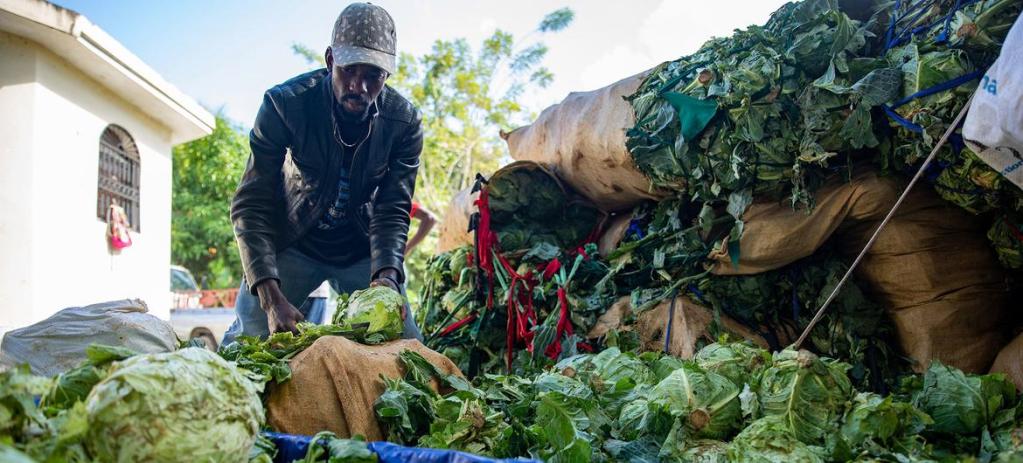
Story
22 March 2024
How is the UN supporting Haiti’s struggle to overcome violence and instability?
Haiti is in the grip of widespread gang violence, the country’s institutions are on the verge of collapse and its citizens are facing a daily fight for survival. Yet, in the midst of this catastrophic security and humanitarian crisis, the UN continues to provide critical assistance to the beleaguered population.1. The context: Lawlessness and fearWhile the situation in Haiti has long been characterized by lawlessness, with powerful gangs controlling much of the capital, Port-au-Prince, the months of January and February 2024 have been the most violent in the last two years, with over 2,500 people killed, kidnapped or injured since the start of the year. The decision of Prime Minister Ariel Henry, in March 2024, to step down has further complicated the situation.On 21 March, Ulrika Richardson, the UN Humanitarian Coordinator in Haiti, warned that the violence is now spilling out into new areas of the capital, including formerly peaceful suburbs, following weeks of orchestrated gang attacks on prisons, ports, and hospitals. Ms. Richardson said that human rights violations are widespread; sexual violence, with the use of torture and “collective rape” against women, is rampant, she said.The senior UN official described a growing humanitarian crisis, with over 362 000 internally displaced persons, a lack of clean water and less than half of health facilities in Port-au-Prince functioning at normal capacity.Hunger has reached unprecedented levels, according to a new assessment released on 22 March and backed by the UN. According to the report, 4.97 million people face crisis or worse levels of acute food insecurity, including 1.64 million people facing “emergency” levels.More and more people are attempting to leave the capital, risking passing through routes controlled by gangs. At least thirty-three thousand left to find refuge in the provinces in March, most of them heading to the Grand Sud departments, a region that already hosts more than 116,000 displaced persons. 2. The humanitarian response: Delivering under fireSince the beginning of the latest crisis, marked by a series of coordinated gang attacks at the end of February across Port-au-Prince that led to a state of emergency and the eventual resignation of Prime Minister Henry, UN workers have continued to distribute aid to the civilian population despite the hazardous security conditions. The World Food Programme (WFP) has distributed some 160,000 hot meals, while the World Health Organization (WHO) has delivered a range of essential health supplies, and planes from the UN Humanitarian Air Service (UNHAS) have flown in around 800kg of blood pouches.The UN, along with partners, has been trying to address the lack of access to clean water: for example, between 16-18 March UNICEF and the NGO Solidarités International delivered 20,500 gallons of water to four sites that are home to over 12,000 displaced people while between 17 and 20 March, the UN migration agency IOM delivered 16,000 gallons of water to two sites.Support from the UN reproductive health agency, UNFPA, and partner NGOs is being provided to victims of gender-based violence, in the form of a hotline providing psychosocial assistance, and a sexual and reproductive health/sexual and gender-based violence mobile clinic in one of the sites for internally displaced persons. 3. The multilateral responseFinding a way to end the Haitian crisis has been the subject of several high-level UN meetings. On 21 March the Security Council, the UN organ charged with maintaining international peace and security, issued a press statement reiterating its members support for a “Haitian-led, Haitian-owned political process”, and stressed the need for the international community to redouble its efforts to provide humanitarian assistance to the population and to support the Haitian National Police. The members of the Security Council also expressed grave concern at the illicit flow of arms and ammunition into Haiti that remains, they said, a fundamental factor of instability and violence.Back in October 2023, the Security Council authorized the deployment of a multinational security support (MSS) mission to Haiti at the request of the then government. The resolution was hailed at the time as a historic first, although the mission has yet to be deployed. 4. Funding: A massive gap to fill In the meantime, several senior officials from the UN System continue to call for a significant uptick in funding for the humanitarian effort.On Thursday, Ms. Richardson noted that the humanitarian response plan for Haiti, which requires $674 million, is only six per cent funded. “Time is running out,” she said.Earlier in March, Cindy McCain, the head of the World Food Programme, warned that the aid effort was “running on fumes”. 5. An uncertain futureThe MSS mission to bolster the understaffed and under resourced Haitian National Police is expected to be led by Kenya, with troops also promised by several Caribbean countries. The US has pledged some $300 million, according to media reports. Although this is not a UN mission, it has been authorized by a Security Council resolution. However, while there is widespread agreement that Haiti urgently needs help to bring about a secure and stable environment, the mission was thrown into disarray by Mr. Henry’s resignation, which prompted Kenya to announce that it would delay the deployment until the announcement of a new Haitian government.According to media reports, political groups are close to agreeing on a transitional council that would take over presidential powers until elections can be held. It is unclear if and when the council will take power or when the security mission will begin operating on Haitian soil. This article first appeared in UN News.
1 of 5
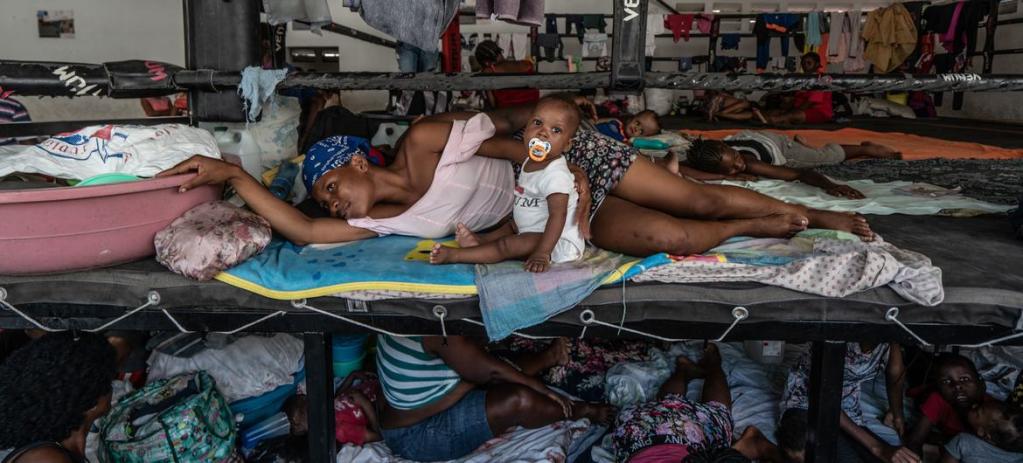
Press Release
15 April 2024
Statement attributable to the Spokesperson for the Secretary-General - on the establishment of the Transitional Presidential Council in Haiti
The Secretary-General welcomes the publication on 12 April of the decree formally establishing the Transitional Presidential Council and urges all Haitian stakeholders to continue making progress in putting in place transitional governance arrangements, including the timely appointment of an interim Prime Minister and government, and the nomination of the members of the Provisional Electoral Council. The Secretary-General takes note of the functions of the Transitional Presidential Council, including working with all members of the international community to accelerate the deployment of the Multinational Security Support (MSS) mission authorized by Security Council Resolution 2699 (2023). He reiterates his call on all Member States to contribute to the MSS.Stéphane Dujarric, Spokesman for the Secretary-General
New York, 13 April 2024
New York, 13 April 2024
1 of 5
Press Release
12 March 2024
Statement attributable to the Spokesperson for the Secretary-General – on Haiti
The Secretary-General takes note of the agreement reached yesterday by Haitian stakeholders on a transitional governance arrangement, including the establishment of a Presidential Council and the appointment of an interim Prime Minister. He also takes note of Prime Minister Ariel Henry’s announcement that he would resign immediately upon the installation of a Transitional Presidential Council.The Secretary-General expresses appreciation to CARICOM, and other international partners, for facilitating a way forward to resolve Haiti’s political crisis and calls on all Haitian stakeholders to act responsibly and to take steps towards the implementation of the agreement in order to restore the country’s democratic institutions through peaceful, credible, participatory and inclusive elections. The United Nations, through its mission, will continue to support Haiti on its path towards elections.The Secretary-General reiterates his unwavering solidarity with the people of Haiti who are in need of safety, shelter, food and medical care, and to live their lives in dignity.Stéphane Dujarric, Spokesman for the Secretary-General
New York, 12 March 2024
New York, 12 March 2024
1 of 5
Press Release
08 December 2023
Statement attributable to the Spokesperson for the Secretary-General – on Haiti
New York, 07 December 2023 - The Secretary-General is concerned over the limited progress in the inter-Haitian dialogue towards a lasting and inclusive political solution to restore the country’s democratic institutions.
The Secretary-General extends his full support to the efforts of the CARICOM Eminent Persons Group and to BINUH to facilitate sustainable and nationally-owned solutions to Haiti’s political crisis.
He looks forward to the continued preparations for the deployment of urgently needed security support to the Haitian National Police, through a Multinational Security Support mission, as authorized by resolution 2699 (2023).
The Secretary-General underlines the importance of an agreement on the restoration of democratic institutions - providing for credible, participatory and inclusive elections - to achieving sustainable rule of law and security. He appeals to the full range of political actors and stakeholders in Haiti to come together and reach a broad consensus as a matter of priority.
1 of 5
Press Release
01 December 2023
Leadership Communautaire : Clé de Voûte de l'Éradication du SIDA en Haïti
Port-au-Prince, Haiti, December 1st, 2023 – On World AIDS Day, celebrated each year on 1 December, UNAIDS is calling for action to further strengthen community leadership in Haiti, which represents a crucial element in defeating the pandemic by 2030.
This year, World AIDS Day is commemorated under the theme "Let Communities Lead". Indeed, the new UNAIDS report highlights that achieving the 2030 goal of ending AIDS as a public health threat, is only possible if communities on the frontlines obtain the full support they need from governments and donors.
With an estimated HIV prevalence of 1.7% among adults (15-49 years) in 2022, Haiti has made significant progress in its response to the pandemic, reducing new infections by 21% and AIDS-related deaths by nearly 75%, between 2010 and 2022. These achievements are a result of the determination of civil society organizations and community associations, social workers, and activists whose invaluable commitment has been instrumental in combating stigma and discrimination at national level.
The United Nations System in Haiti is calling for support to communities of people infected and affected by HIV and AIDS, and who are fully committed to and engaged in the response. "It is with them and their commitment that we can succeed in eliminating the threat of AIDS. Eliminating inequalities is equally critical to changing the lives of people living with HIV and the communities most vulnerable to HIV infection", stated Maria Isabel Salvador, Special Representative of the Secretary-General of the United Nations in Haiti.
"Community-based organizations have for a long time represented the backbone of the HIV response in Haiti. Their unwavering support is fundamental to eradicating the AIDS pandemic and achieving the Sustainable Development Goals ", highlights Ulrika Richardson, Resident Coordinator of the United Nations System in Haiti and Humanitarian Coordinator, simultaneously stressing the critical role of health in Haiti's development.
Recognizing the 20th anniversary of the U.S. Government President's Emergency Plan for AIDS Relief (PEPFAR), which coincides with this internationally-celebrated annual event, Dr. Christian Mouala, UNAIDS Country Director in Haiti, said: "PEPFAR has been a key partner for Haiti, establishing solid partnerships across key national and international stakeholders. We celebrate this dynamic collaboration and call for its continued strengthening to achieve our common goal.”
Since its first commemoration in 1988 by the United Nations General Assembly, 1 December has symbolized a day of global reflection, assessment of progress made and strategic readjustment in the global response to HIV/AIDS. UNAIDS' ambitious 95-95-95 targets for 2025 highlight the importance of accurate knowledge of HIV status, universal access to antiretroviral treatment, and viral load suppression among people on antiretroviral therapy.
*****
En savoir plus sur la Journée mondiale 2023 (ONUSIDA)
Pour plus d'informations, veuillez contacter :
Wegbert Chery, Conseiller Egalité et Droit pour Tous et Toutes (ERA) à l’ONUSIDA en Haïti ; Tél : +509 46512125; Courriel : cheryw@unaids.org
Igor Rugwiza, Responsable communication du Bureau de la Coordonnatrice Résidente ; Tel : +509 48084749 ; courriel : rugwiza@un.org
Béatrice Nibogora, Responsable communication du Bureau intégré des Nations Unies en Haïti ; Tel : +509 36537043 ; Courriel nibogorab@un.org
1 of 5
Press Release
14 June 2023
MEDIA ADVISORY - SAVING LIVES: ADDRESSING FOOD SECURITY NEEDS OF HAITI
Special Event http://bit.ly/HaitiFreeOfHunger
Friday, 16 June 2023, 10:00am – 1:00pm
WHERE: Trusteeship Council Chamber, United Nations Headquarters, New York
WHAT: Nearly half of the population in Haiti doesn’t have enough to eat. In rural areas, 76 percent of people are affected by food insecurity. Restoring livelihoods is fundamental to the humanitarian response. Launched in April 2023, the UN Humanitarian Response Plan for 2023 called for an unprecedented $719 million - almost double from 2022. To date, the plan is only 20% funded. The recent floods and earthquake have shown that Haiti’s humanitarian needs remain considerable and will continue to grow as the hurricane season starts. Building on the work of ECOSOC Advisory Group on Haiti, ECOSOC will convene a special meeting to mobilize action and resources in support of food security in Haiti and to call on the international community to show solidarity with the Haitian people and contribute to the funding appeals.
WHO:
Opening will include:
· President of the United Nations Economic and Social Council, H.E. Lachezara Stoeva
· Prime Minister of Saint-Vincent and the Grenadines and Chair of the Community of Latin American and Caribbean States (CELAC), H.E. Ralph Gonsalves
· Prime Minister of Jamaica, H.E. Andrew Holness
· Minister of Planning and External Cooperation of Haiti, H.E. Ricard Pierre
· Chair of the ECOSOC Ad Hoc Advisory Group on Haiti and Permanent Representative of Canada to the United Nations, H.E. Bob Rae
· Executive Director of the World Food Programme, Ms. Cindy H. McCain
· Executive Director of UNICEF, Ms. Catherine Russell
Followed by a roundtable:
· Permanent Representative of Rwanda to the United Nations, H.E. Claver Gatete (moderator)
· Vice Minister of Bilateral Affairs of the Dominican Republic, H.E. José Julio Gómez
· Deputy Special Representative of the Secretary General and Resident Coordinator and Humanitarian Coordinator in Haiti, Ms. Ulrika Richardson
· Ms. Edem Wosornu, Director, Operations and Advocacy Division, OCHA
· Mr. Guangzhou Qu, Director, Food and Agriculture Organization (FAO) Liaison Office with the United Nations
· Ms. Patrizia Tumbarello, Mission Chief for Haiti, International Monetary Fund (IMF)
· Mr. Laurent Msellati, Country Manager for Haiti, World Bank Group
· Mr. William O’Neill, Independent Expert on the situation of human rights in Haiti For a full programme, please visit http://bit.ly/HaitiFreeOfHunger
WEBCAST: The event will be streamed live on https://media.un.org
HASHTAG: #HaitiCantWait
ACCESS: The event is open to all UN accredited media.
MEDIA CONTACT: Paul Simon, Office for Intergovernmental Support and Coordination for Sustainable Development, Department of Economic and Social Affairs E: simonp@un.org
T: +1 917 367 5027 | M: +1 347 267 5618
1 of 5
Latest Resources
1 / 11
Resources
09 November 2022
Resources
27 September 2022
1 / 11

